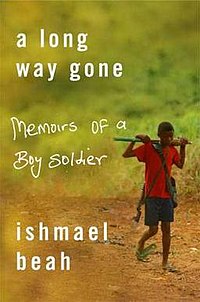Ishmael Beah: Difference between revisions
→Further reading: new claims about Ishael Beah's past in this article |
|||
| Line 44: | Line 44: | ||
* Beah, Ishmael (2007). ''A Long Way Gone: Memoirs of a Boy Soldier''. Sarah Crichton Books. ISBN 978-0-374-10523-5. |
* Beah, Ishmael (2007). ''A Long Way Gone: Memoirs of a Boy Soldier''. Sarah Crichton Books. ISBN 978-0-374-10523-5. |
||
* Beah, Ishmael (2000). [http://www.wagingpeace.org/articles/2000/08/00_beah_good-bad.htm When Good Comes From Bad], Nuclear Age Peace Foundation. |
* Beah, Ishmael (2000). [http://www.wagingpeace.org/articles/2000/08/00_beah_good-bad.htm When Good Comes From Bad], Nuclear Age Peace Foundation. |
||
http://www.theaustralian.news.com.au/story/0,25197,23075054-32682,00.html |
|||
==References== |
==References== |
||
Revision as of 13:40, 19 January 2008
 | |
| Author | Ishmael Beah |
|---|---|
| Language | English |
| Subject | History, Civil War |
| Genre | Memoir |
| Publisher | Sarah Crichton Books |
Publication date | 2007 |
| Media type | Hardcover and Audio Cd |
| Pages | p. (first edition, hardback) |
| ISBN | ISBN 978-0-374-10523-5 (first edition, hardback) Parameter error in {{ISBNT}}: invalid character |
Ishmael Beah (born on November 23, 1980 in Sierra Leone[1]) is the author of the memoir, A Long Way Gone: Memoirs of a Boy Soldier.
In 1991, a vicious civil war overtook Sierra Leone. His parents and two brothers were killed; at the age of 13, he was pressed into service as a child soldier. He fought for almost three years before being rescued by UNICEF.[1] He fought in the war, and after the war he continued to fight. Later in 1998, he fled from Freetown due to the increasing violence there and traveled to New York City. He now considers his foster mother, Laura Simms, his mother. In New York City, Beah attended the United Nations International School in Manhattan. After high school, he attended Oberlin College, graduating in 2004 with a degree in Politics.[1]
During his time in the government army, Beah says he killed "too many people to count." He and other soldiers smoked marijuana and sniffed amphetamines and "brown-brown", a mix of cocaine and gunpowder. He blames the addictions for his violence[2] and cites the addictions and the pressures of the army as reasons for his inability to escape on his own: "If you left, it was as good as being dead."[3]
During an appearance on The Daily Show on February 14, 2007, Beah said that he believed that returning to civilized society was more difficult than the act of becoming a child soldier—that dehumanizing children is a relatively easy task.[4] Rescued in 1996 by a coalition of UNICEF and NGOs, he found the transition difficult. He and his fellow child soldiers fought frequently. He credits one volunteer, Nurse Esther, with having the patience and compassion required to bring him through the difficult period. She recognized his interest in American rap music, gave him a Walkman and a Run-D.M.C. cassette, and employed music as his bridge to his past, prior to the violence. Slowly, he accepted her assurances that "it's not your fault."[5]
Living in Freetown with an uncle, he went to school and was invited to speak in 1996 at the UN in New York. When Freetown was overrun by the joined forces of the rebels (RUF or Revolutionary United Front) and Army of Sierra Leone in 1997 (the Army of Sierra Leone was originally fighting against the RUF), he contacted Laura Simms, whom he had met the year before, and made his way to the United States.[5]
"If I choose to feel guilty for what I have done, I will want to be dead myself," Beah said. "I live knowing that I have been given a second life, and I just try to have fun, and be happy and live it the best I can."[3]
While at college at Oberlin, Beah pursued advocacy work against the abuse of children in wartime. He spoke at the UN and met with leaders including Bill Clinton and Nelson Mandela.[1]
"A Long Way Gone" was nominated for a Quill Award in the Best Debut Author category for 2007.
He currently works for the Human Rights Watch Children’s Division Advisory Committee,[2] lives in Brooklyn, and is considering attending graduate school.[3]
He was the keynote speaker to the Global Young Leaders Conference 2007, July 15-26 session, and was the keynote speaker at Oberlin College's 175th convocation ceremony. He is also scheduled to be the keynote speaker for the 2008 College Conference at Montreat.
Further reading
- Beah, Ishmael (2007). A Long Way Gone: Memoirs of a Boy Soldier. Sarah Crichton Books. ISBN 978-0-374-10523-5.
- Beah, Ishmael (2000). When Good Comes From Bad, Nuclear Age Peace Foundation.
http://www.theaustralian.news.com.au/story/0,25197,23075054-32682,00.html
References
- ^ a b c d UNICEF, Youth leadership profiles, . Retrieved February 15, 2007.
- ^ a b James Pitkin, Willamette Week, Ishmael Beah—An ex-child soldier's trip from Sierra Leone's war to a Starbucks bookshelf., February 14, 2007. Retrieved February 15, 2007.
- ^ a b c Alissa Swango, NYC24, the Columbia University Graduate School of Journalism, A Child Soldier Grows Up, 2006. Retrieved February 15, 2007.
- ^ The Daily Show with Jon Stewart, February 14, 2007 [1].
- ^ a b Andrew Gumbel, the New Zealand Herald, Long march to normal life for a former child soldier, January 24, 2007. Retrieved February 16, 2007.
External links
- ALongWayGone.com - Official site for the book, A Long Way Gone: Memoirs of a Boy Soldier
- Video: Interview on The Daily Show, February 14, 2007.
- Interview on Fresh Air with Terry Gross, February 21, 2007.
- Online interview from CBC Words at Large
- Information on speaking appearances
- Interview on Enough Rope with Andrew Denton, July 2, 2007.
